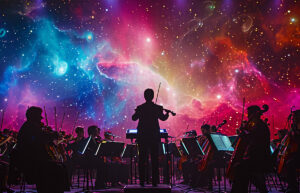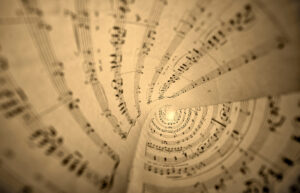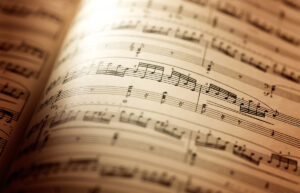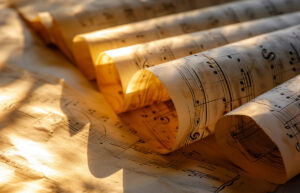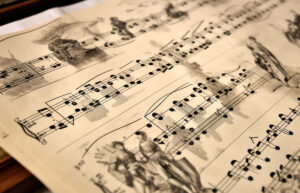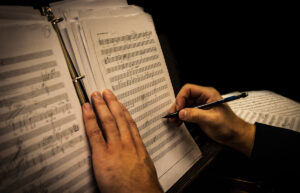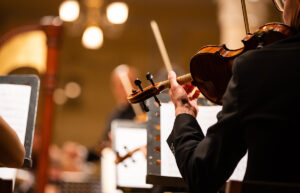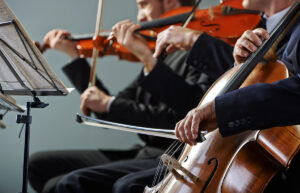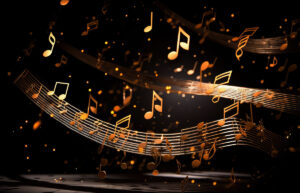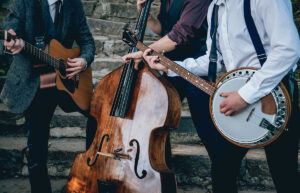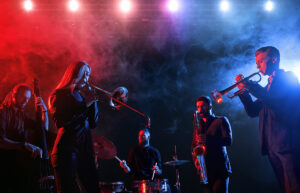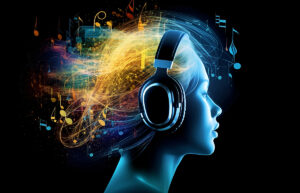When was Music Invented: Meaning, Origin, History & Instruments

The comprehensive guide takes you on a journey through the enigmatic beginnings of music, tracing its evolution from the primal beats of the Prehistoric era to the diverse musical landscape of Ancient Civilizations. Immerse yourself in the melodic history of the Middle Ages and the Renaissance, discovering how music reflected societal shifts and cultural transformations. Uncover the significance of understanding the origin of music, its profound connections with human expressions, and the crucial role played by ancient musical instruments in shaping our musical heritage. Whether you’re a passionate enthusiast or a curious explorer, this guide promises an enlightening odyssey through the captivating world of music’s origins.
Welcome to TheDemoStop, now join the community!
Connect with artists, fans and producers around the world.
Origin of Music
Music, a timeless language that transcends barriers, traces its origins to the dawn of humanity.
While the precise beginning eludes us, our early ancestors tapped into rhythms and sounds around them, infusing chants, beats, and melodies into communal rituals, storytelling, and daily life, gradually paving the way for sophisticated musical systems and genres.
The origin of music is as diverse as the rhythm that resonates through it. From the rhythmic patterns of stones and bones to the evolution of handmade instruments, music has developed as a way to communicate emotions, share experiences, and weave connections among communities.
Its roots are deeply intertwined with human history, evolving over centuries as an integral part of society, transcending geographical boundaries, and continuously adapting to reflect the ever-changing human experiences.
Brief history of music
Music has a rich tapestry that weaves through the ages, carrying stories of human expression across civilizations and cultures. Its history is a vibrant melody that begins with ancient rituals and primal beats, evolving into sophisticated compositions and genres that define our modern soundscape.
Music’s evolution parallels humanity’s evolution, with each era contributing unique rhythms, instruments, and styles. The journey of music spans millennia, from the primal beats and chants of early civilizations to the classical symphonies of renowned composers such as Bach and Beethoven. It embraces the evolution of jazz, rock, pop, and hip-hop, reflecting societal changes, cultural revolutions, and individual expressions.
This history resonates with the rhythm of human emotions, weaving a timeless melody that connects us all across time and space.
Importance of understanding the origins of music
Understanding the origins of music holds immense significance as it unveils the rich tapestry of human culture, emotions, and history woven through melodies and rhythms across civilizations. Exploring music’s roots fosters a profound connection with our heritage, enabling us to comprehend societal beliefs, traditions, and the evolution of human expression.
By delving into its origins, we gain insights into the diverse cultural influences, technological advancements, and the universal language that music has become. This knowledge offers a deeper appreciation for the varied musical genres, ignites creativity, and cultivates a sense of inclusivity by celebrating the multifaceted narratives that music encapsulates within its timeless tunes.
Prehistoric Era: The beginnings of music
In the ancient Prehistoric Era, music emerged as a vital part of human expression. Though there are no written records, evidence suggests that our early ancestors used simple instruments and vocal sounds to convey emotions, tell stories, and connect with one another. Music in this era was raw, primal, and deeply connected to rituals, celebrations, and daily life, laying the groundwork for the art form we cherish today.
Human communication through sounds
Before the advent of language, humans communicated through sounds. Without written or spoken words, our ancestors relied on a rich tapestry of vocalizations, chants, and rhythm to convey emotions, share experiences, and pass down traditions. These primitive forms of communication through sounds served as the cornerstone for the evolution of music, paving the way for the diverse musical expressions we enjoy today.
Ancient civilizations: Music takes shape
The foundational role of music in ancient societies such as Mesopotamia, Egypt, and Greece showcased its diverse significance, spanning from cultural identity to spiritual practices and philosophical musings.
Mesopotamia (The birthplace of written music)
Mesopotamia, credited as the birthplace of written music, marked a significant milestone with its earliest known musical notations, a notable leap forward in recording music.
Welcome to TheDemoStop, now join the community!
Connect with artists, fans and producers around the world.
Egypt (Music as a form of worship and entertainment)
Ancient Egypt embraced music’s duality, employing it in both religious ceremonies and festivities, highlighting its roles in both spiritual devotion and social entertainment.
Greece (The influence of music on philosophy and culture)
Greek civilization celebrated music as an influential tool for education, therapy, and cultural expression, leaving an indelible mark on philosophy and culture.
Middle Ages: Music in the Medieval Period
Music in the Medieval Period was a diverse blend capturing the essence of spiritual reverence and worldly expressions. It encompassed three main categories:
Sacred vocal music
Reverberating through cathedrals, Gregorian chants, sung in Latin, encapsulated the period’s spiritual essence with solemn melodies rooted in religious devotion.
Secular vocal music
Beyond religious settings, troubadours and minstrels brought stories of courtly love, chivalry, and daily life to life. Their repertoire, ranging from epic ballads to lively dances, captivated audiences of both nobility and commoners, celebrating the narratives of everyday life.
Instrumental music
Though less documented, instrumental compositions with instruments like the lute, harp, flute, and vielle enriched the era’s sonic tapestry. These ensembles added melodies and harmonies to celebrations, banquets, and theatrical performances.
Music in the Renaissance
Music underwent substantial changes during the Renaissance that reshaped its social, harmonic, and theoretical elements. It marked a period of creativity and innovation that continues to impact musical expression today.
Social Change
During the Renaissance, music became a vital part of social life, supported by church patronage and wealthy individuals, enabling composers to create art reflecting cultural shifts. It transitioned from serving solely the church to entertaining courts and nobility, embracing humanist ideals, and exploring secular themes.
Harmony and Style
Composers in this era experimented with polyphony, layering melodies to create intricate and expressive musical styles like madrigals, chansons, and motets, marked by vibrant rhythms. Josquin des Prez and Giovanni Pierluigi da Palestrina were influential figures in shaping these innovative styles.
Notation and Theory
Renaissance musicians developed new notation systems and theoretical frameworks, enhancing Western music theory. Movable type printing facilitated wider distribution of musical scores, preserving and sharing musical ideas.
Ancient musical instruments
Ancient Musical Instruments reveal a diverse world field with captivating musical tools that embody various cultures and historical periods. Among these treasures, a few stand out:
Mesopotamian lyre
An ancient string instrument esteemed for its captivating tunes symbolizing harmony and artistic expression in Mesopotamian culture.
Medieval citole
A precursor to the guitar, this unique plucked instrument resonated across medieval Europe, enriching its musical landscape.
Ancient Egyptian harp
Enriching Egypt’s musical legacy, this harp created celestial sounds that echoed through temples and palaces, enchanting its listeners with ethereal melodies.
Chinese flute
Revered for its elegant simplicity, the Chinese flute captured the essence of ancient Chinese music, narrating tales through its serene tunes.
Lute
Adorning various ancient cultures, the lute’s intricate design and melodious string enriched musical compositions, resonating with depth and resonance across civilisations.
Welcome to TheDemoStop, now join the community!
Connect with artists, fans and producers around the world.
Conclusion
In conclusion, this all-encompassing guide to the origin of music has illuminated various facets of music, offering these pivotal insights:
- Origin of music: The roots of music stretch back to the dawn of humanity when our ancestors infused rhythms and melodies into communal life.
- Brief history of music: This vibrant melody waves through the ages, from primal beats to classical symphonies and modern sounds, mirroring humanity’s journey.
- Importance of understanding the origin of music: Understanding music’s origins unveils our cultural heritage, fosters inclusivity, and deepens appreciation for diverse musical genres.
- The beginnings of music in the prehistoric era: Simple instruments and vocal sounds shaped the raw primal essence of music in early human society.
- Music takes shape in the ancient civilization: Mesopotamia, Egypt, and Greece influenced music’s evolution through recorded notations, religious use, and cultural impact.
- Music in the medieval period: Sacred vocals, secular compositions, and instrumental pieces defined the diverse musical landscape of this era.
- Music in the Renaissance: A period of innovation where music reflected social changes, experimented with harmony, and witnessed advancements in notation and theory.
- Ancient musical instruments: Instruments like the Mesopotamian Iyre, medieval citole, Egyptian harp, Chinese flute, and lute shaped the musical heritage of ancient civilizations.
FAQs
What is the History of Music?
The history of music dates back to the earliest human civilizations, marked by the use of simple instruments, chants, and rhythmic sounds. Originating from communal rituals, storytelling, and daily life, music evolved across cultures, incorporating diverse instruments and styles.
Why is it important to understand the origin of music?
Understanding the origin of music is crucial as it unveils our shared human history and the cultural evolution tied to it. It offers insight into the universal language of music, fostering a deeper connection to our roots and enabling a broader appreciation of its influence on our world today.
Where did music originally come from?
Music, as a profound language, originates from the earliest times of human existence. Although pinpointing its exact birth remains a mystery, our ancestors tapped into rhythms and sounds, integrating them into communal rituals, daily life, and storytelling. These foundational rhythms gradually evolved, fostering diverse musical systems and genres we cherish today.
What was music like in the medieval period?
During the medieval period, music was primarily religious, focusing on sacred chants and melodies performed in churches and monasteries. Alongside this, secular music thrived, featuring lively dances, troubadour songs, and courtly music performed at social gatherings and in royal courts. Instruments like harps, lutes, and recorders accompanied vocal music, enhancing the sung melodies.
How did ancient civilizations use music?
Ancient civilizations embraced music across various facets of life, employing it in religious ceremonies, cultural celebrations, storytelling, and communal gatherings. Music served as a tool for expressing emotions, preserving traditions, fostering unity, and connecting individuals within these diverse civilizations.
How did ancient Greece influence music?
Ancient Greece profoundly influenced music by introducing scales, notation systems, and various musical instruments. Their musical theories and philosophies laid the groundwork for modern music theory and practice, leaving a lasting impact on the foundation of Western music.
How did prehistoric people first create music?
Prehistoric people crafted music by embracing the rhythms and sounds of their surroundings, using natural materials like stones, bones, and their bodies. These early expressions became rhythmic beats, chants, and melodies woven into communal rituals and daily life, setting the stage for the evolution of handmade instruments and the captivating language of music.
What are the famous ancient musical instruments?
Renowned ancient musical instruments include the Mesopotamian lyre, Medieval citole, Ancient Egyptian harp, Chinese flute, and Lute. The instruments symbolize harmony and artistic expression across diverse cultures and eras.

















